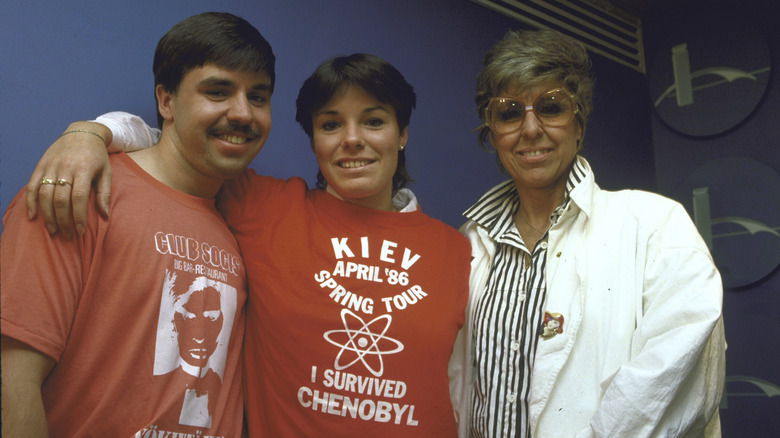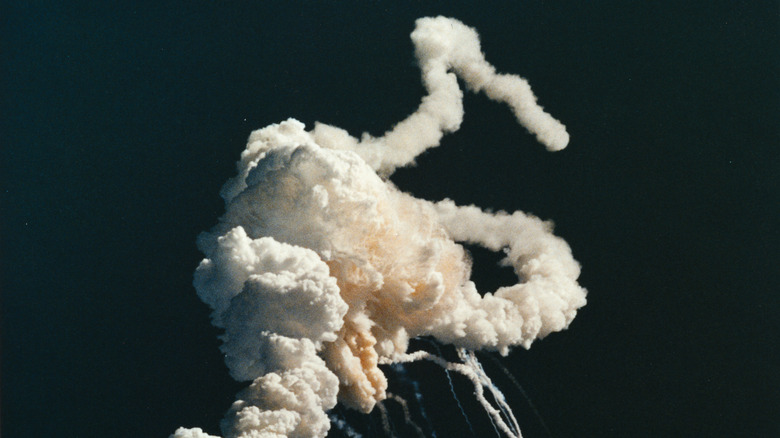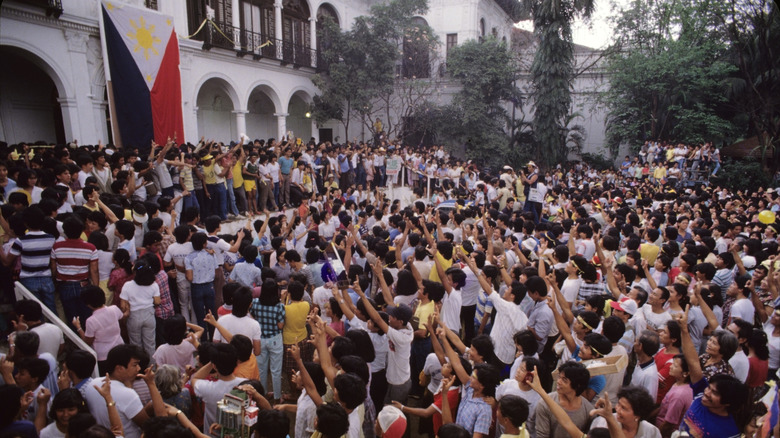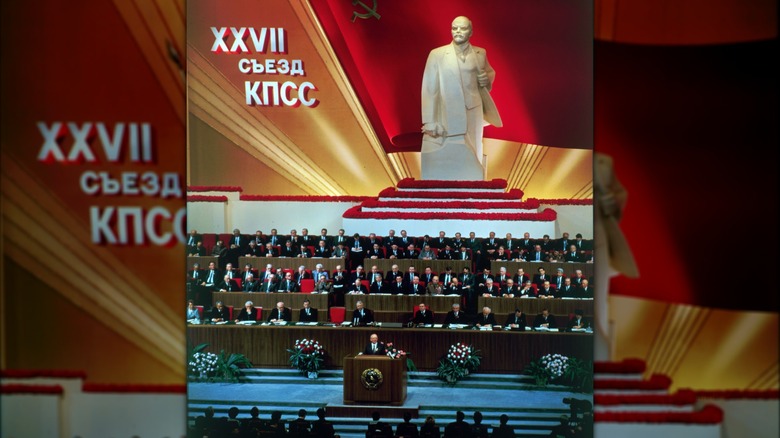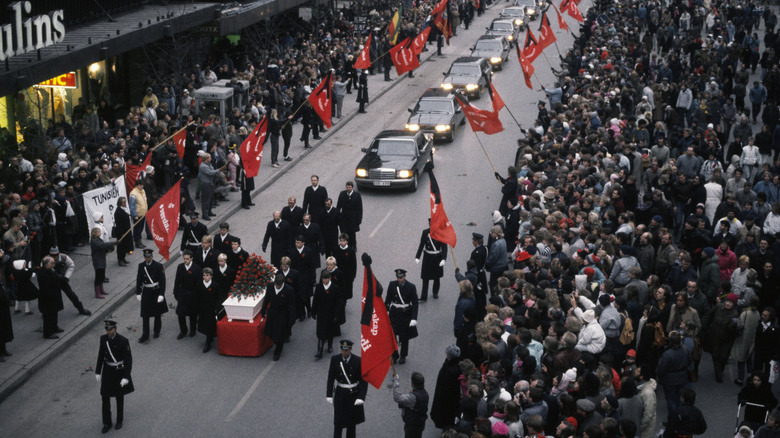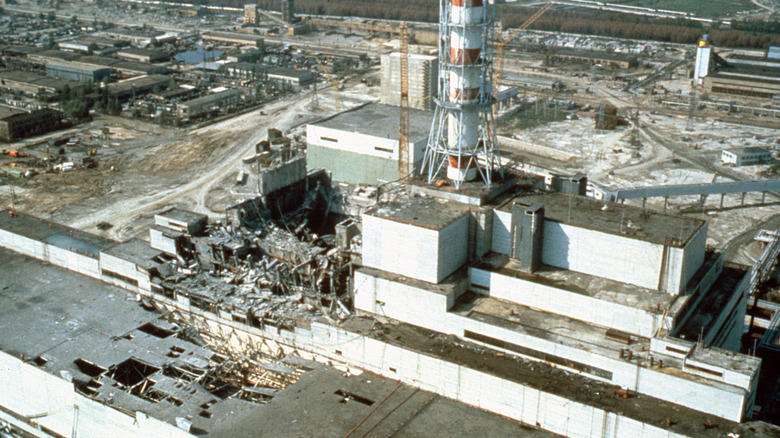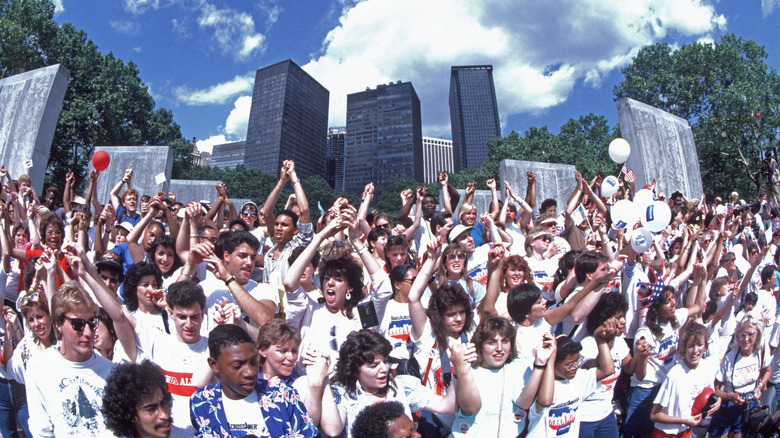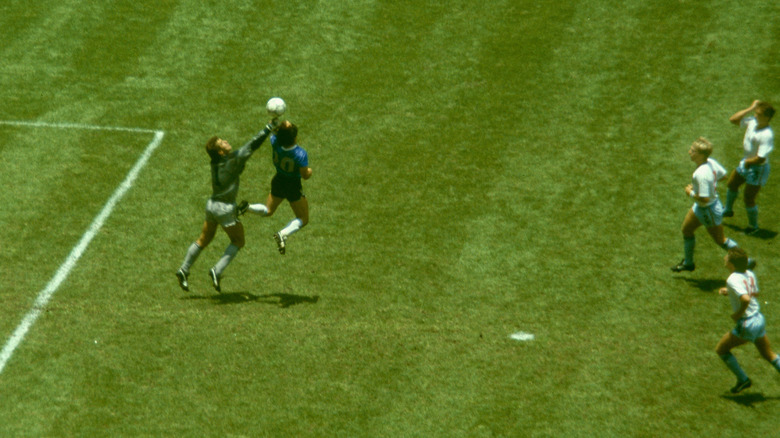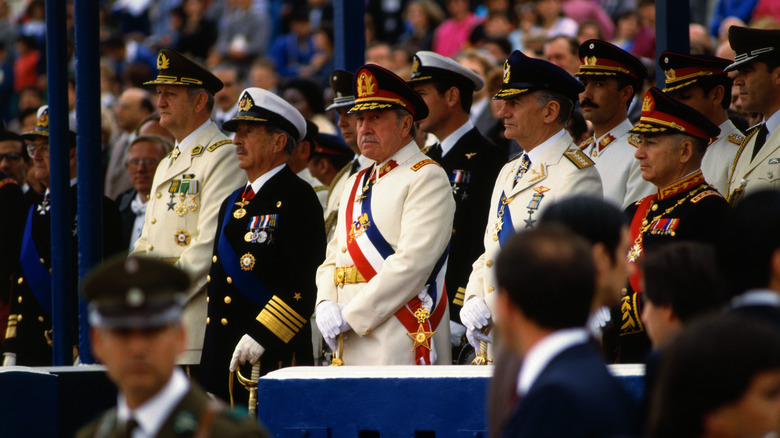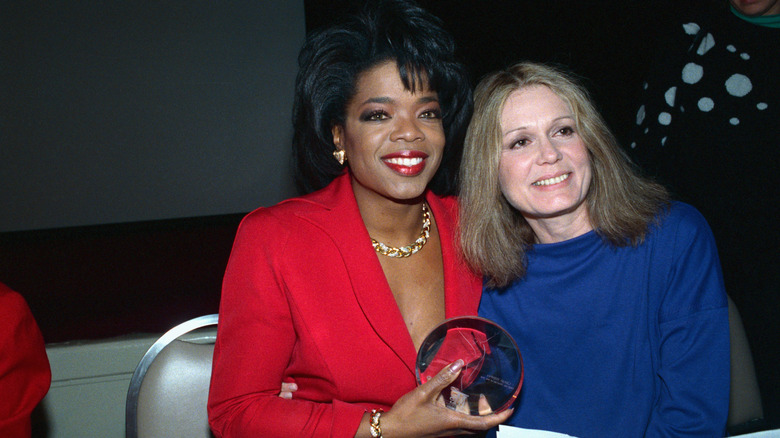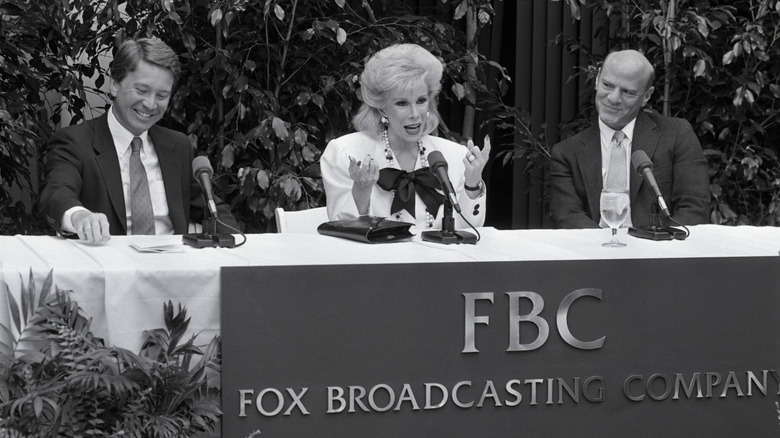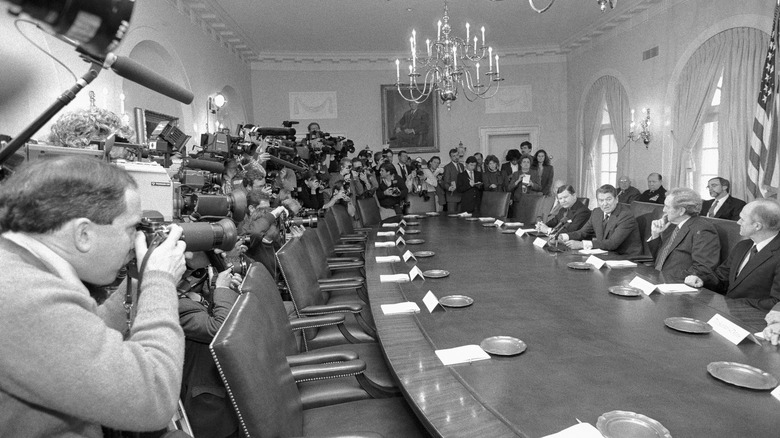Events From 1986 That Changed Lives Forever
While every year has landmark moments that the people who lived through them never forget, 1986 managed to pack its 12 months with an exceptional number of significant events. In the entertainment world, the Rock & Roll Hall of Fame inducted its first — and, controversially, all-male — class. The then-Duke of York, Prince Andrew (now Andrew Mountbatten Windsor), married Sarah Ferguson in a lavish royal wedding. And in the science realm, Halley's Comet passed Earth for the first time since 1910.
While all memorable and significant, these events didn't necessarily affect that many people on a really deep, life-changing level. But the year wasn't lacking in those more serious, tragic, or groundbreaking events, not by a long shot. It famously saw both the Chernobyl and Space Shuttle Challenger disasters, but those were just the tip of the iceberg. Here are some of the events from 1986 that changed lives forever.
January 28 – Space Shuttle Challenger disaster
When the Space Shuttle Challenger prepared to head into space, there were five astronauts on board — Francis "Dick" Scobee, Michael Smith, Judith Resnick, Ronald McNair, Ellison Onizuka– as well as a government contractor, Gregory Jarvis. The crew also included a civilian for the first time ever: a teacher named Christa McAuliffe. She was selected from thousands of hopefuls in the "Teacher in Space" project, explaining in her application, "I watched the Space Age being born and I would like to participate" (via the National Air and Space Museum). Tragically, just 73 seconds after liftoff, on live TV, the Space Shuttle Challenger exploded, killing everyone on board.
NASA was never the same after the Challenger Disaster, and neither were many people who watched the footage, either live or on the news. Decades later, people still remembered where they were when the disaster occurred, whether it was seeing it on TV at an airport or having to explain to Florida schoolchildren what they had just witnessed right in front of them.
In his eulogy for the crew, President Ronald Reagan said, "On the day of the disaster, our nation held a vigil by our television sets. ... We waited and watched and tried to make sense of what we had seen. That night, I listened to a call-in program on the radio; people of every age spoke of their sadness and the pride they felt in our astronauts" (via the Ronald Reagan Presidential Library and Museum).
February 22 – The People Power Revolution
Ferdinand Marcos was elected president of the Philippines in 1965, but soon became a dictator. He placed the country under martial law for years, exerting total control over all aspects of government and brutally crushing opposition. There are many people still alive today to share their stories of the torture they suffered under his regime.
Things finally came to a head after the country's opposition leader was assassinated in 1983, and Marcos was the obvious suspect behind the murder. In 1986, Marcos declared a snap election, but his subsequent win was extremely suspect. Millions of people gathered in the streets of Manila, non-violently protesting for days. While some members of the military had been planning to overthrow Marcos, this was a spontaneous demonstration outside of that plot. Steven Bosworth was the U.S. Ambassador to Manila at the time. When Marcos told him that he needed to fight the military coup being mounted against him, Bosworth replied, "Well, we don't agree that it's a military coup any longer. We think that it is something bigger than that" (via the Association for Diplomatic Studies and Training).
It would become known as The People Power Revolution. After four days of protest, the Marcos regime collapsed.
February 25 – Glasnost and Perestroika
At the 27th Party Congress, General Secretary of the Communist Party Mikhail Gorbachev addressed the Soviet government's most important officials for over three hours in an astonishing speech. Perhaps most surprising was his announcement that two themes, "Glasnost" and "Perestroika" ("openness" and "restructuring"), would define his premiership and the USSR going forward. These radically altered the country and its place in the world during the Cold War.
After the transcript of the speech reached Washington, D.C., Time spoke to shocked officials. An unnamed policymaker said, "This speech has made a number of us take a much more serious look at Gorbachev as a man who is not just making broad, sweeping pronouncements. He's considering some very serious changes in the system." An expert in the State Department shot out of his office and exclaimed, "This is big stuff. This guy is serious."
It helped that Mikhail Gorbachev and Ronald Reagan's relationship was congenial, even though their summits did not always yield positive results. The Cold War relationship between the two enemy countries improved slowly but steadily, while Gorbachev's changes within the Soviet Union began to break down the old, corrupt order. This would eventually result in the collapse of the USSR.
February 28 – Swedish Prime Minister Olof Palme is assassinated
Swedish Prime Minister Olof Palme liked to live as normal a life as possible. This evening, he walked home from the movies with his wife, Lisbeth, having already dismissed his bodyguards. Tragically, before the couple made it home, they were both shot. While Lisbeth survived, Olof was assassinated. Three years later, a man was arrested for the crime, but the extremely weak conviction was overturned on appeal, and it was generally accepted that he was innocent.
The murder and mystery continued to affect Sweden. For years, it seemed like the world would never know the truth of Olof Palme's assassination. There were a number of different conspiracy theories about who did it or what group was behind it. Then, in 2020, after three years of leading a fresh investigation, the Library of Congress records that prosecutor Krister Peterson announced to the world, "We can't get around a certain individual as the murderer. ... That individual is Stig Engström." This name didn't come out of nowhere, as he was present at the murder scene and had long been a suspect. But since Engström died by suicide in 2000, there was nothing more to be done, and the case was closed.
"The shots ... on that February night in 1986 turned into a crisis, a wound, a riddle without an answer," Prime Minister Stefan Lofven said (via BBC News), adding: "It is my sincerest wish that the wound can now begin to heal."
April 13 – The first child born to a non-related surrogate mother is born
Louise Brown was famously the first "test tube baby," born through IVF in 1978. But eight years later, another major moment in fertility treatments occurred when the first child born to a non-related surrogate mother was born. This meant that for the first time, a pregnancy made it to term when the fetus shared no genes with the woman carrying it, or the now not-uncommon process known as gestational surrogacy. This opened up a new, safe way for people who wanted children but faced fertility issues to conceive.
The trailblazing baby was Jill Rudnitzky (now Brand, pictured). People are fascinated by her story; when she was growing up, even her classmates understood how significant it was. In an interview with the Michigan Fertility Alliance in 2025, she said, "When Phoebe got pregnant on 'Friends,' my friends would be like, 'That's because of your parents and you!'"
As an adult, she had her own issues conceiving her second child and sought medical assistance. "My fertility doctor, when I told her my story, because you know it came up pretty quickly, she was so like, 'Oh my god.' It's like I was Beyoncé," she said.
April 26 – Chernobyl disaster
There were many mistakes that caused the Chernobyl disaster. The 1986 Summary Report of the International Atomic Energy Agency's International Nuclear Safety Advisory Group stated that "the accident was caused by a remarkable range of human errors and violations of operating rules in combination with specific reactor features which compounded and amplified the effects of the errors and led to the reactivity excursion" (via the World Nuclear Association). The result was the worst nuclear disaster ever, and it cost hundreds of millions to make safe.
The initial explosion of the fourth reactor at the nuclear plant in the USSR (now Ukraine) killed two people outright. Over the next three months, 29 additional victims died from the effects of their work containing the fire and radiation. More than 100,000 people were evacuated, most of whom never returned to their homes. Over the course of the next few decades, those affected saw over 5,000 thyroid cancer diagnoses, of whom 15 died.
While a few people chose to return to live in the exclusion zone around the plant, and it is possible to visit as a tourist, Chernobyl effectively remains a ghost town to this day.
May 25 – Hands Across America
The decade saw many celebrity-fronted charity events, so it wouldn't be surprising if Hands Across America is one of the big moments from the 1980s you forgot about – the last of the many similar events in the 1980s. The thing that set it apart, however, was that anyone could get involved, and 5.5 million people participated. The idea was to form a chain of people holding hands briefly, stretching across the entire U.S.
While the goal of an unbroken chain of people was not realized, people have wonderful memories from that day. "I remember the local organizers and volunteers running around with walkie-talkies and clipboards trying to line people up," participant Keith Campbell told the Akron Beacon Journal in 2021. "When the event came to its hand-holding climax, I remember there were definitely gaps in the human chain, but it didn't seem to matter. There was a general sense of joy ... When it was over, everyone went home — perhaps forever changed by this grand display of unified humanity ... or perhaps not." The effort raised $15 million after costs, which was distributed to charities working to end hunger in the U.S.
June 22 – 'Hand of God' and 'The Goal of the Century' World Cup match
A quarterfinal World Cup match would normally not go down in soccer history, but England vs. Argentina is one of the most famous matches of all time. Argentina's star player, Diego Maradona, scored one of the most controversial goals ever. It would become known as the "Hand of God" goal after a sarcastic comment Maradona later made about it. When he realized he wouldn't beat the England keeper, Peter Shilton, to the ball, Maradona punched it into the net with his fist. The ref, his view partially blocked, thought the Argentinian had headed the ball and allowed the goal. England player John Barnes told Goal, "All of us on the bench — the players, the coaches, the manager — we all saw it clear as day. We all knew he'd handled the ball, so we just couldn't believe the referee hadn't seen it."
That alone would have made the match iconic. In his autobiography, Maradona wrote, "That goal became part of soccer history. There are still 10-year-old kids out there today with 'Maradona' on their backs." The fact that within four minutes the soccer phenom would score the textbook-perfect "The Goal of the Century," dancing around England players with the ball for over half the length of the pitch, was just a bonus.
Elsewhere in the sporting world, Mike Tyson won his first heavyweight title on November 22, taking down Trevor Berbick with a TKO in the second round.
September 7 – Augusto Pinochet survives an assassination attempt
Augusto Pinochet took over Chile in a coup in 1973 and ruled as the head of the military dictatorship until he was finally removed in 1990. By 1986, however, it was clear he was losing his iron grip on the country despite — or rather because of — his repressive policies.
On September 7 that year, the Chilean dictator's motorcade was ambushed by at least a dozen rebels. They attacked the cars with multiple kinds of weapons, including machine guns and grenades. The resulting casualties included five dead bodyguards, and 11 others were injured. Somehow, Pinochet escaped virtually scratch-free. "There was very intense gunfire," he said (via UPI). "My first reaction was to get out of the car, but I was traveling with my grandson, aged 10, and I covered him with my body." The attack clearly indicated just how unpopular his regime had become, but Pinochet was defiant. "Try to kill me: I'm a soldier, I'm ready," he said, according to BBC News. Within days, he was front and center at a military event (pictured).
Two years later, Chile began its transition to democracy after a national referendum saw a majority of the country vote to oust the Junta.
September 8 – Oprah goes nationwide
Originally seen only on a local Chicago station, Oprah Winfrey was introduced to the nation on this date; the topic of "The Oprah Winfrey Show's" first episode was "How to marry the man or woman of your choice." It was fellow Chicago resident and iconic film critic Roger Ebert who pushed to have Winfrey's talk show broadcast nationally, and it proved to be a brilliant idea. Her show quickly became must-see TV, particularly for women.
"The Oprah Winfrey Show" ran for 25 seasons, and was the No. 1-rated talk show for 24 of them in a row. By the time it ended in 2011, Oprah was a household name and an icon for women, as well as a billionaire business mogul.
Something was in the air in 1986, as the entertainment world saw many notable premieres besides Oprah's. "Top Gun" was released on May 16, and the film would have such enduring appeal that a successful, much-anticipated sequel was released almost three decades later. London also saw the opening of Andrew Lloyd Webber's now-iconic musical "The Phantom of the Opera" on October 9.
October 9 – News Corporation launches Fox Broadcasting Company
Love it or hate it, there is no question that FOX News changed the world after its debut in 1996. But it wouldn't have been possible without Rupert Murdoch's controversial decision to launch Fox Broadcasting Company a decade earlier.
In 1985, Murdoch's News Corp. had purchased 20th Century Fox; when it acquired the TV stations from media company Metromedia the following year, the mogul combined the two companies to create the Fox Broadcast Company and entered the world of network TV, which was then on the decline. However, Fox chairman and chief executive Barry Diller saw the potential in low viewer figures, telling The New York Times, "The fragmented audience is not an audience that went out to play gin rummy. It went to watch independent stations, and it is an audience to be gathered."
As for how they would succeed where ABC, NBC, and CBS were failing, Diller said, ”We won't be like the three television networks."
November 3 – Iran-Contra affair revealed
On this day, the Lebanese magazine Ash-Shiraa broke the story of what would become known as the Iran-Contra affair. This involved the Reagan administration's very illegal actions of secretly selling Iran weapons in the hope of getting hostages in Lebanon released, despite publicly having sanctions on Iran. Even worse, they were then sending the money from the illegal sales to a paramilitary rebel group in Nicaragua. This was in direct violation of the Boland Amendment, which Congress passed in 1982, making it illegal for the U.S. to assist in overthrowing that country's government.
It quickly became one of the biggest White House scandals of all time. On November 25, Attorney General Edwin Meese stood at the podium in the White House Press Briefing Room and admitted the accusations were true: "Certain monies which were received in the transaction between representatives of Israel and representatives of Iran were taken and made available to the forces in Central America, which are opposing the Sandinista government there" (via The Washington Post).
The following year would see blockbuster congressional hearings on the matter, and the scandal was only brought to a close when George H.W. Bush became president and issued pardons for many of those involved.
